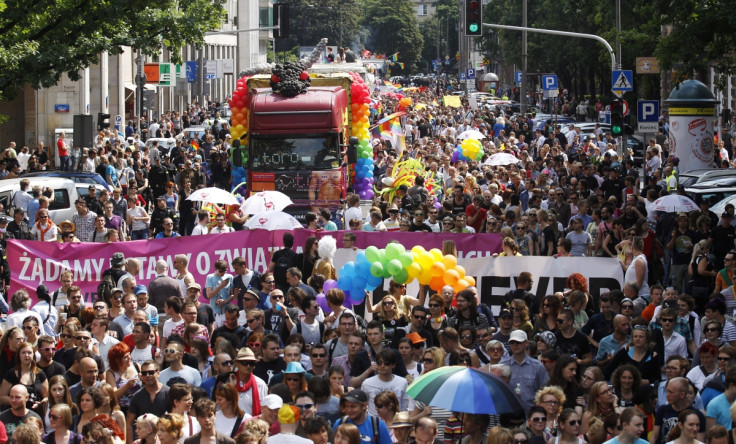Poland 'abandoning' hundreds of victims of LGBT and other hate crimes

Poland's legal system has fallen dangerously short when it comes to protecting lesbian, gay, bisexual, transgender and intersex people and other minority groups from hate crimes, Amnesty International has said in a report.
The NGO says the state has excluded whole communities from hate crime legislation, including homeless people, people with disabilities and the LGBTI community. The report comes less than two months ahead of Poland's general election.
Marco Perolini, Amnesty International's expert on discrimination in Europe and Central Asia, said: "Poland has a two-tiered legal system that protects some minority groups but leaves others to fend for themselves. If you are a gay man or woman, a person with a disability or a homeless person in Poland and attacked because of who you are, the police will just treat it as an ordinary crime, not as a hate crime – this dangerous protection gap must be closed immediately."
The LGBTI community in Poland faces widespread and ingrained discrimination across the country. While there are no reliable official statistics, Polish organisation Campaign against Homophobia recorded at least 120 homophobic or transphobic hate crimes in 2014 alone. The true figure is expected to be much higher due to underreporting.
In May 2015, Dariusz, an anti-Nazi activist and street artist, was kicked and spat on in front of one of his murals depicting a rainbow in Zywiec, while verbally abused as a "faggot whore". In the record of the judgement against the perpetrator, the insults are described as "vulgar" with no mention of a homophobic motive.
Poland has also seen a number of attacks on homeless people over the past years. Amnesty states the attacks were at least partially motivated by the victims' socioeconomic status, but they have been treated as ordinary crimes by the police. One victim, Stanisław, a homeless man from the south-eastern city of Rzeszów, was beaten up and set alight in October 2012.
Perolini says there is also negative discourse on refugee issues in Poland. "A couple of NGOs told us recently that they have lately received more cases of verbal abuse or threats against refugees, asylum seekers and migrants," he says. "Last Saturday, there was an attack against a restaurant owned by a Polish citizen of Lebanese origin and allegedly perpetrated by two people who attended an anti-refugee demonstration."
While steps have been taken to tackle hate crimes fuelled by racism and xenophobia, other minority groups still face daily fears and harassment. "Poland has obligations under international law to ensure that all minority groups are equally protected from discrimination. The fact that authorities are failing to do so is actually discriminatory in itself," Perolini says.
The protection gap means that there are no institutional mechanisms – like specialised prosecutors or police coordinators – to deal with attacks based on discrimination along the lines of disability, sexual orientation, gender identity or social and economic status.
According to the report, Poland is also lacking effective policies to prevent such hate crimes, investigate all cases and prosecute perpetrators. There is also no systematic effort to collect data on attacks against these groups by the state, meaning that authorities have no way of knowing the scope of the problem.
Efforts to reform the criminal code have stalled, despite a bill being tabled in 2012 to protect LGBTI individuals, people with disability or older people from hate crimes. The proposal has met resistance from some parts of Polish society, with one MP earlier this year calling it an attempt "to introduce a sick ideology of gender which promotes sexual pathologies".
Marco Perolini, an author of the report and a researcher on discrimination in Europe at Amnesty International, said the timing of the report is also key with Poland's upcoming general elections.
"The Polish Parliament has been debating changes to hate crime laws for years but failed to pass them," he says. "The new Parliament and governments should commit to proposing and adopt those changes. However, the party who is leading the polls (law and justice) is against extending hate crime laws to other groups, especially LGBTI people."
© Copyright IBTimes 2025. All rights reserved.






















